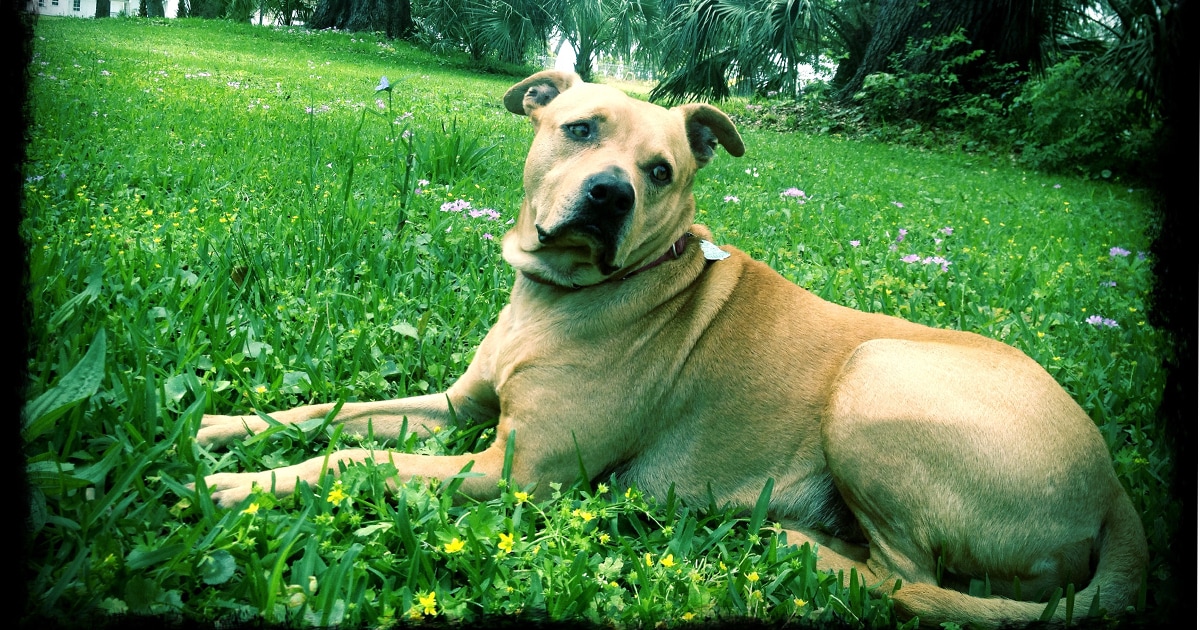Paying Your Respects
Could an outpouring of community condolences on the loss of an antisocial dog stem from the coast's hurricane culture?
- story and photo by Ellis Anderson
Buster was different. Since he wandered into my life shortly after Katrina destroyed the gallery, he’d led more of a cloistered life. His heritage remained a mystery and his looks condemned him to canine profiling. While a genetic test determined Buster had a boxer heritage, most people assumed he was a pit bull. Parents would snatch their toddlers off the sidewalk when we approached.
Buster’s demeanor didn’t do him any favors either. Around strangers, he wore a perpetual look of suspicion. I remembered the same worried brow from old Humphrey Bogart movies, when the actor played characters who'd just broken out of jail. If someone outside of Buster’s tight inner circle of people tried to pet him, the brawny dog would shrink back, fearful, expecting malice. Although he could have taken almost any human down in a heartbeat, I never saw any aggression, only angst in those situations. So what accounts for the communal compassion for an antisocial dog, one that unintentionally inspired more fear than warm-fuzzies? I’ve lived other places where tears shed over the loss of a dog were cause for derision. “Get over it,” I’ve been told. “It was only a dog, for Pete’s sake.” That has never happened to me here and I’ve been wondering why. Of course, Bay St. Louis and Waveland are known as “dog towns.” Most locals recognize that all dogs are service dogs. They’re here to remind humans we’re not rulers of the universe — we are merely an integral part of it. But the fact we’re canine-friendly communities still doesn’t explain the sort of wholesale compassion I experienced after Buster’s death. I’m beginning to believe the extraordinary outpouring wasn’t motivated by attachment to a particular dog, or neighborly feelings for the dog’s owner. It was ignited by a shared empathy. Most of us here have lost more - and more times - than a person has a right to expect. We don’t like to think about hurricanes in the fair-weather months, but they’ve shaped our culture. In most cases, for the better. A friend once told me that on our coast, you try to stay on good terms with all your neighbors: you never know when your life will depend on them. Because this hurricane culture is one of repeated loss — through many generations — it has also taught us that value has no connection with money. The cost of things is irrelevant, because the truly precious belongings can’t be replaced with all the gold in the world.
All of us who lived through Katrina have grieved bitterly for even simple objects. We invested memories in those touchstones, banking joy that could be endlessly withdrawn with only a glance. The treasured photo album. An ancient tree we played beneath as a child. A family heirloom, like the ship's bell from the schooner your great-grandfather sailed around Cape Horn.
So we tend not to judge when a friend suddenly tears up in a casual conversation recalling a belonging snatched by Katrina, or even Camille. It’s not for us to ridicule attachment to a seemingly trivial object. Or a neurotic pit bull. Here on the Gulf Coast, the phrase “paying your respects” has taken on deeper meaning. The cause of the grief is almost irrelevant. The respect we offer is more for the love that has made the loss so hard to bear. Comments are closed.
|
Categories
All
Archives
July 2024
|
Shoofly Magazine Partners
Our Shoofly Partners are local businesses and organizations who share our mission to enrich community life in Bay St. Louis, Waveland, Diamondhead and Pass Christian. These are limited in number to maximize visibility. Email us now to become a Shoofly Partner!




























 RSS Feed
RSS Feed























